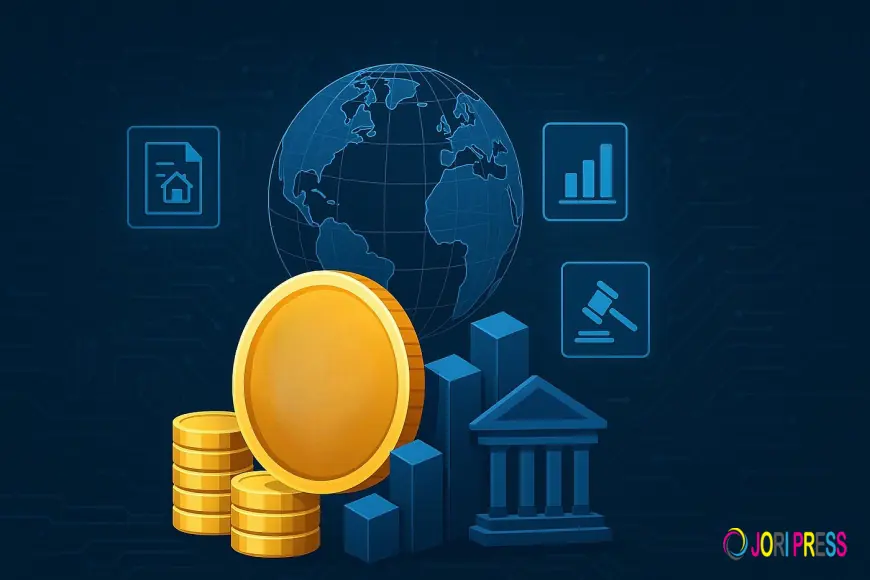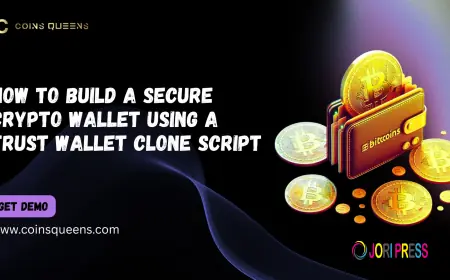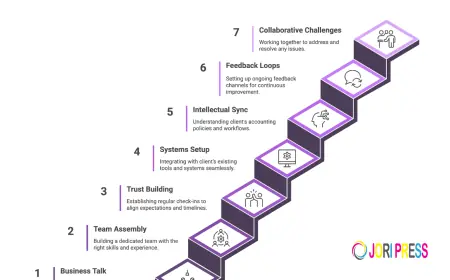Web3 Meets Metaverse: Crafting the Tokens That Will Shape the Future
Web3 and the metaverse are shaping digital ownership. Explore how Crypto token development and expert token development companies power future virtual economies.

The digital world is moving fast. Every year, new platforms, networks, and economic models are introduced, but few shifts have attracted as much attention as the growth of Web3 and the metaverse. These two concepts are no longer buzzwords used only by developers and early adopters. They have become part of mainstream conversations in finance, entertainment, gaming, and online communities. What connects these two massive shifts is one element: tokens. The foundation of ownership, identity, and value in the next digital era depends on how these tokens are created and how they work. As Web3 meets the metaverse, the importance of Crypto token development becomes clear, especially for businesses that want to build long-term digital ecosystems.
The Convergence of Web3 and the Metaverse
Web3 represents a decentralized version of the internet. In this model, users hold their own data, assets, and identities without relying on centralized platforms. On the other side, the metaverse is a digital environment where people socialize, work, trade, and interact through virtual worlds. When these two concepts come together, they create a digital space where users own virtual property, trade assets, and move between platforms using decentralized identity and currency systems.
This combination is pushing new opportunities for businesses and creators. The metaverse is expanding with virtual land, digital shops, character skins, event tickets, and digital experiences. Web3 provides the infrastructure that ensures these assets can be owned, traded, and verified. Tokens serve as the medium that links user activity with economic value. Without tokens, the metaverse would remain a closed environment controlled by a single platform. With them, it becomes an open network where users and builders share the value they create.
Why Tokens Are the Core of the Future Digital Economy
Tokens are not new. They have been around since the early days of blockchain. What is new is the scale at which they are being used. Virtual assets inside the metaverse, ownership records, passes, rewards, and governance systems all rely on tokens. These tokens provide a secure way to verify ownership without a central authority. They allow users to hold assets in their own wallets and move them across platforms.
The need for reliable Crypto token development has increased because metaverse projects require tokens that support high transaction volume, flexible utility features, and security. Businesses that plan to launch digital assets or create virtual economies often work with a token development company to design tokens that support payments, rewards, governance, and cross-platform compatibility.
The token economy inside the metaverse is not limited to one type of asset. Virtual land can be represented by NFT-based tokens, while utility tokens handle payments and access to digital services. Governance tokens allow community members to make decisions about upgrades, policies, or new features. As more platforms adopt these models, token interoperability becomes essential.
How Token Utility Drives Metaverse Growth
Utility determines the long-term relevance of any token. Early tokens were mainly speculative, but the metaverse creates demand for tokens that have a purpose beyond market value. In digital worlds, tokens allow users to buy property, trade equipment, join communities, participate in events, or access exclusive content. They can also be used as reward systems to motivate participation or contribution.
Token utility grows when platforms offer real functions. For example, digital identity tokens can help users carry reputation and customization across multiple virtual worlds. Payment tokens allow frictionless transactions inside games, marketplaces, or social platforms. Access tokens can be used to enter events or restricted spaces inside the metaverse. Governance tokens allow users to vote on upgrades and community policies.
As digital environments expand, demand for tokens with useful functions increases. This is where professional Crypto token development becomes important. The design, economics, and security of a token decide whether it will support sustainable growth or fail under network pressure.
Economic Modeling and Token Design in the Metaverse
A token is not only a digital asset; it is part of a broader economic model. Designing a token for a metaverse platform requires understanding supply, distribution, user incentives, and long-term sustainability. Poorly designed token economies often face hyperinflation, user drop-off, or rapid price collapse. Well-designed systems, on the other hand, balance supply and demand to keep the ecosystem active.
Economic design depends on how tokens will be used. Payment tokens must have stable supply mechanisms and low volatility. Reward tokens should be distributed based on user activity without overwhelming the system. Governance tokens should be allocated in a way that gives active members a voice without letting a small group control everything.
A token development company usually builds these models based on the project’s goals. Tokenomics also includes long-term plans for liquidity, treasury management, and community growth. Since the metaverse relies heavily on user engagement and asset mobility, tokenomics must encourage participation and maintain value across platforms.
Security and Infrastructure Challenges
As the metaverse expands, security becomes a major concern. Token contracts handle ownership, transfers, and asset permissions. Any vulnerability can cause asset loss or system breakdown. This is one reason why businesses rely on experienced teams for Crypto token development. Smart contract audits, stress testing, and adherence to blockchain standards help eliminate risks.
Security also includes protecting user wallets, ensuring safe cross-chain transfers, and preventing unauthorized duplication of digital assets. Because metaverse ecosystems handle real value and large communities, reliability is not optional. Every token used within a virtual world must meet strict security expectations to maintain trust.
Another challenge is scalability. The metaverse involves high-volume interactions: item trading, event participation, land transactions, and avatar customization. Tokens used in these environments must operate on networks that support fast confirmation times and low transaction fees. Layer-2 solutions, sidechains, and optimized contract architectures help platforms achieve these goals.
Interoperability and Cross-Platform Movement
The metaverse is expected to operate as a network of interconnected virtual worlds rather than isolated platforms. This means tokens should move across systems seamlessly. Interoperability ensures that a user can carry their digital identity, land ownership, items, or payment tokens across multiple experiences.
Cross-chain bridges and multi-chain token standards enable this movement. Tokens created for metaverse environments often support multiple blockchain networks to allow flexibility. A token development company may implement multi-chain architecture to expand reach and reduce dependency on a single network.
Interoperability also improves the user experience. Instead of rebuilding assets for every platform, users can maintain a consistent identity and inventory. Businesses benefit as well since interoperable tokens help them reach global audiences and form partnerships with other virtual worlds.
Real Use Cases Taking Shape Today
The metaverse is not a distant concept. Thousands of active platforms use token-based systems today. People buy virtual land, trade in-game equipment, attend virtual concerts, and participate in digital learning programs. Social platforms inside virtual worlds offer digital stores, membership clubs, and content creation tools powered by tokens.
Digital brands are also launching presence inside these spaces. They create token-based experiences such as limited-edition items, interactive events, and loyalty programs. These experiences rely on secure token mechanisms to verify ownership and manage participation.
Work environments are exploring virtual offices where employees can collaborate inside 3D spaces. Tokens help manage access control, identity verification, and reward systems for engagement. Education platforms use tokens to represent achievements, course access, or learning progress.
The common element across these use cases is the need for reliable token infrastructure. As more organizations adopt metaverse strategies, demand for customized Crypto token development increases.
The Role of Businesses and Developers in Token Innovation
Businesses entering Web3 and the metaverse face new responsibilities. They must work with developers who understand blockchain, economic models, decentralized governance, and virtual world mechanics. Many organizations partner with a token development company to build tokens that fit their goals.
Developers must consider user flow, in-world behavior, interoperability, and long-term sustainability. Simple token creation is not enough. The token must support ongoing functionality in a dynamic environment.
Companies that want to build marketplaces, social platforms, or virtual workplaces must ensure that their tokens provide value and seamless user experience. Tokens that are poorly implemented create friction, reduce user trust, and limit adoption. Well-executed tokens become core elements of community engagement and digital economies.
User Ownership and the Shift Away From Centralized Platforms
One of the biggest changes brought by Web3 and the metaverse is the shift toward user ownership. Traditional game and social media platforms control assets, user data, and digital identities. In the metaverse, Web3 systems allow users to hold their own items without platform restrictions. This shift increases user control and opens opportunities for secondary markets, asset mobility, and cross-platform identity.
Ownership creates long-term connection between users and digital environments. Instead of losing items when a game ends or a platform shuts down, users keep their assets in wallets independent of the platform. This new ownership model is powered by tokens and secured by blockchain.
The ability to own digital items also encourages user creativity. People can design items, build structures, and launch experiences that can be sold or shared. Token-based systems support revenue sharing, royalty mechanics, and creator rewards. As more creators join metaverse worlds, token systems must expand to support millions of digital assets and transactions.
Future Trends Shaping Token Development for the Metaverse
The next wave of innovation will bring advanced token features and new use cases. Dynamic tokens, which evolve based on user activity, will personalize user experiences. Identity tokens will help users move across virtual worlds with consistent reputation and customization.
Programmable tokens will allow automatic updates, actions, or behavior based on conditions inside virtual environments. Cross-chain systems will become more stable, allowing tokens to move effortlessly between networks.
Artificial intelligence will also influence token-driven ecosystems. AI-powered characters, marketplaces, and digital assistants will use tokens for activity tracking, ownership records, and economic interactions.
These advances will require strong infrastructure and professionals with expertise in Crypto token development to create flexible and secure token systems.
Preparing for a Tokenized Digital Future
The convergence of Web3 and the metaverse marks the start of a new digital economy. Tokens will define how people buy, sell, trade, interact, and build in virtual worlds. Businesses that recognize this shift early will have an advantage. They can create their own economic models, digital assets, and user experiences that rely on transparent and decentralized systems.
Organizations planning to enter the metaverse should focus on building tokens with clear utility, strong tokenomics, and secure smart contracts. Working with an experienced token development company can help design systems that align with long-term goals and adapt as technology evolves.
As virtual worlds expand, tokens will play a central role in connecting platforms, empowering users, and enabling new forms of digital interaction. The technology is still growing, but the direction is clear. Tokens are not optional—they are the foundation of the future digital landscape.
What's Your Reaction?
 Like
0
Like
0
 Dislike
0
Dislike
0
 Love
0
Love
0
 Funny
0
Funny
0
 Angry
0
Angry
0
 Sad
0
Sad
0
 Wow
0
Wow
0


















































